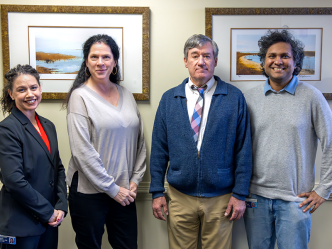Following a successful first year, Robert Gordon University (RGU), Augusta University, University of Aberdeen, and University of Georgia College of Pharmacy, along with new partner the National Health Service Education for Scotland (NES), are preparing to jointly hold the second year of Converge International Rural Health Symposium.
This year, RGU will host the virtual symposium Nov. 2-3.
“We are very excited to be hosting the symposium from RGU this year,” said Sheelagh Martindale, PhD, the academic strategic lead in Professional Workforce Development within the School of Nursing, Midwifery and Paramedic Practice at RGU. “Our partnerships built around this symposium have strengthened over the last year, and we look forward with enthusiasm to building on last year’s success with Converge 2022.”
This year, the symposium is open to all, including faculty, health care professionals, students and others with an interest in rural health. To register, email the conference planning team.
Read more: Augusta University awards Converge grants to four collaborative research projects focused on rural health
This second-annual virtual multidisciplinary conference builds upon the success of Converge in 2021 and will further deepen Augusta University’s trans-Atlantic partnerships, according to Neil J. MacKinnon, PhD, executive vice president for academic affairs and provost at Augusta University.
“The inaugural Converge symposium set a very high bar with a dozen expert panelists from Georgia and Scotland, and more than 150 participants joining in breakout groups,” MacKinnon said. “Faculty, clinicians, students and other attendees from both sides of the Atlantic Ocean look to learn from each other on the topic of rural health. This is a vital component of our new focus on deeper, meaningful international partnerships with a focus on collaboration.”

The conference, which was spearheaded by the Office of the Provost, focuses on spotlighting innovative and collaborative efforts to provide better care with limited resources through educational and training initiatives from health professions, colleges and universities. The Office of the Provost has provided $100,000 to fund pilot projects that tackle rural health issues among the collaboration partners.
The interactive rural health symposium focuses on understanding of rural health challenges and seeking opportunities to foster collaboration. The symposium will feature rural health experts from the partnering universities and the NES. Catalyst talks, panels and roundtable discussions will focus on access to care, experiential learning, and connectivity and emerging opportunities.
During the virtual symposium, expert panelists will present innovative and creative solutions they’ve developed in access to care, experiential learning and connectivity challenges. These presentations will foster discussions among breakout groups on ways these strategies might be replicated or enhanced.
Last year’s symposium
Last year, several faculty members from Augusta University provided detailed presentations on the issues facing rural health care, including Dr. Pam Cromer from the College of Nursing and AU alumna Debbie Layman. Both discussed their rural health outreach efforts across Georgia and the annual Costa Layman Health Fair that has provided thousands of health screenings since its inception more than 15 years ago.
Read more: Costa Layman Health Fair connects Augusta University students with community
In addition, Dr. Matt Lyon, vice chair for academic programs and research in the Medical College of Georgia’s Department of Emergency Medicine, and Lauren Williams Hopkins, director of Population Health at Augusta University Health, discussed the difficulties and high expense of delivering quality rural health care.
While health care in Scotland and Georgia can be different on many levels, the two regions share in the persistent challenges of educating for rural health care contexts and of supporting health care professionals in the region.
Learn more about the Converge International Rural Health Symposium.
 Augusta University
Augusta University




